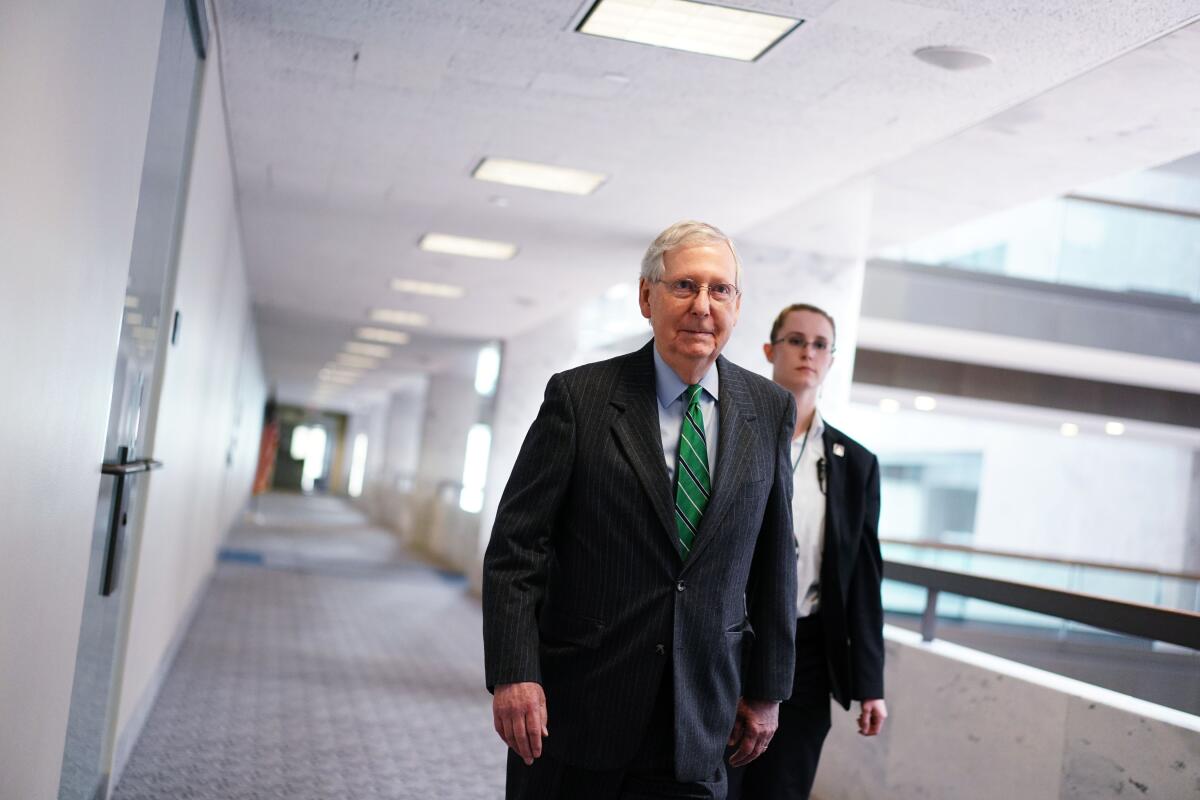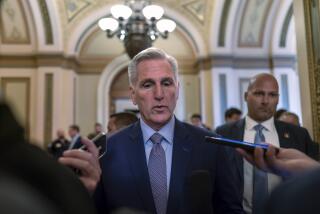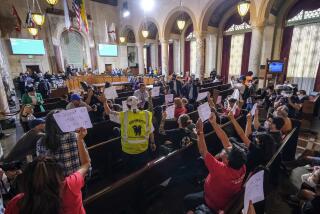As lawmakers begin falling ill from coronavirus, Congress may move to remote work

- Share via
WASHINGTON — Congressional leaders could shut the Capitol down and move operations online as coronavirus spreads through the once-crowded, close-talking halls of Congress, leaving two House members infected so far and many more in quarantine.
Proposals are swiftly being drafted to have lawmakers patch in for votes and debate from afar, raising a question Washington has pondered over the years but never before so directly confronted: Is a virtual Congress possible?
“It’s time for us to turn to this,” said Sen. Rob Portman (R-Ohio), speaking on the Senate floor Thursday after unveiling a bipartisan resolution to allow for remote voting.
“We have the ability to do it in a secure way, an encrypted way, in a way that would protect the fundamental right to vote, and I think it’s important we move forward.”
At least 50 other lawmakers are also pushing a work-from-home Congress.
Congressional leaders who only days ago were trying to quiet such talk are fast adjusting to the reality that it may be the only way Congress can function as the pandemic continues to grow in the United States — and inside the Capitol’s hearing rooms, offices and chambers.
Under House Speaker Nancy Pelosi’s direction, two House committee chairs are investigating how remote voting would work — a shift for the speaker, who opposed the idea as recently as last week.
House Majority Leader Steny Hoyer (D-Md.) wrote in a letter to lawmakers that he expects “that the House will adjust our voting procedures in order to follow the CDC’s recommendations. No decisions have been made on exactly what these changes will be, but we will be discussing all options.”
He then advised lawmakers not to return to the Capitol as scheduled, but to wait until the time comes to vote on the next round of emergency economic legislation in response to the coronavirus crisis — a schedule shift he said was driven by public health concerns.
The Capitol is a potential breeding ground for the COVID-19 illness, a place where hundreds of politicians — many of them elderly — congregate with staffers, journalists and lobbyists, all in close proximity, with little regard for the social-distancing rules public health officials are imploring Americans to follow. There were already a dozen lawmakers in quarantine by late this week.
It is also a building full of traditionalists, and some lawmakers continued to resist even the thought of telecommuting as other major institutions shuttered to protect the public health.
The Capitol doesn’t have a contingency playbook to draw from. An exhaustive effort to put one in place after Sept. 11, 2001, barely got off the ground. Senate Majority Leader Mitch McConnell (R-Ky.) has been opposed to any rule changes that would allow remote voting.
“This has been a 20-year struggle to get some movement in an institution that is so inertia bound,” said Norman Ornstein, a scholar at the American Enterprise Institute who helped create the Continuity of Government Commission after the 9/11 terrorist attacks.
“It became clear to me it would require some catastrophe putting us on the brink of constitutional crisis to force action.”
That moment has arrived, Ornstein said.
The coronavirus threatens to leave enough lawmakers sick or quarantined that a virtual Legislature would probably be more durable than one that tried to keep meeting in person. In Georgia, the entire state Legislature has been urged into quarantine after a state senator tested positive there.
There is general agreement that the logistics are manageable in these days of Zoom meetings, encrypted software and live-streaming. Hacking is a threat, of course. But a less deadly one than the actual virus now spreading through Capitol corridors.
“Conceptually, I imagine it could all be worked out,” said Sarah Binder, a senior fellow in governance studies at the Brookings Institution. “Although there are questions about how quickly such a system could be generated. And of course, there are security concerns.”
It is an admittedly big technological lift, particularly for the Senate, which does not even have electronic voting on the floor.
What does floor debate look like when the speakers are patching in from their living rooms? Will the public still have access to the proceedings through C-SPAN? Who handles counting the votes, and how are they transmitted?
But the bigger questions are not around the technology, but the impact remote voting and debate might have on the ability of lawmakers to actually reach agreements at this critical time when the economy is on the brink and hospitals may soon be overwhelmed.
“I think this is a recipe for disaster at a time they need to move extraordinarily quickly to get together and pass this package,” said Jim Manley, a former top Democratic aide in the Senate. “This would be a big mistake. You will just empower the obstructionist to phone it in from afar, and nothing will ever get done.”
Lawmakers have a much harder time blowing things up when they are locked together in a room, Manley said, face to face with their colleagues all working together to build consensus.
He worries a virtual Congress is a slippery slope, despite backers vowing it would be a temporary, emergency measure that could only be renewed with super-majority support.
“I am convinced it would just open the door, as is usually the case, to further attempts to allow remote voting for years to come,” Manley said.
Lawmakers pushing for the move find the argument unpersuasive. Among them is Rep. Katie Porter, a Democrat from Irvine, who is leading the movement for remote voting. “We’re talking about remote voting for this moment,” she said in a telephone interview. “We’re not talking about a permanent change.”
“If Congress is going to ask business, small and large, local governments, nonprofits, hospitals, universities … to show flexibility, willingness to change what they do, willingness to use technology to think outside the box, Congress cannot be the exception,” Porter said.
Fifty lawmakers signed a letter Porter helped draft calling on House leaders to permit remote voting.
“We cannot stand on tradition if it puts lives — and our ability to be the voice of constituents — at risk,” the letter said. The letter emerged a week after Pelosi (D-San Francisco) declared lawmakers are the “captains of the ship” and would be the last to leave in a crisis.
But that ship is hitting ever-more troubled waters as lawmakers take ill and head into self-isolation. By Thursday, among those in quarantine were House Republican whip Steve Scalise of Louisiana, who disclosed he had had an extended meeting late last week with one of the lawmakers who has since tested positive, Republican Mario Diaz-Balart of Florida.
And Twitter was buzzing with posts from lawmakers demanding remote voting. Among them was Rep. Don Beyer, a Virginia Democrat who was stuck in quarantine.
“It’s 2020,” he wrote. “Congress can and should be able to operate in all circumstances, including without having to be physically present in the same room.”
More to Read
Get the L.A. Times Politics newsletter
Deeply reported insights into legislation, politics and policy from Sacramento, Washington and beyond. In your inbox three times per week.
You may occasionally receive promotional content from the Los Angeles Times.












